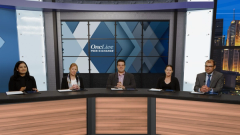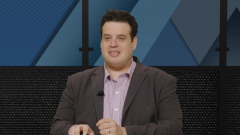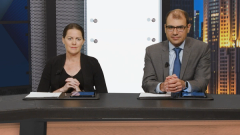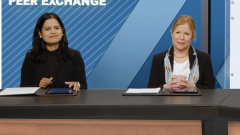
Treatment Duration in Patients With Newly Diagnosed Multiple Myeloma
A panel of experts reflects on treatment duration and its role in optimizing management of patients with newly diagnosed multiple myeloma.
Episodes in this series

Transcript:
Joshua Richter, MD: And along those lines of tailoring, I’m going to turn to this side of the table. Because 2 things you have both spoken about in our discussion of induction is, are we treating to MRD [minimal residual disease] negativity? Are we treating to fixed duration? Treating to intolerance? Would love to hear either of your thoughts about upfront; is it, keep them going?
Natalie S. Callander, MD: We’re just waiting with bated breath to see whether MRD ends up being actionable because we all agree that it may be a biological phenomenon right now. Better patients do better, so they become [MRD] negative, and it’s not clear that that’s going to tell you when you should treat somebody or not. So, as I said, the [phase 3] SWOG 1803 study [NCT04071457] is an incredibly important study. We also [learned] with [the phase 2] MASTER [trial; NCT03224507], you have 2 consecutive MRD negative assessments 6 months apart. It still didn’t help you if you’ve got bad myeloma. So there are a lot of things we have to learn. The other big unexplored area is, does it matter if you become MRD negative at salvage therapy? We’ve got a bit of data, which we’re going to talk about later with CAR T [chimeric antigen receptor T-cell therapy], that that might be good, but again, it may be biology. Of course, you’re MRD negative if you’re a better patient, or, I shouldn’t say [better] patient, but your myeloma is more amenable to treatment.
Susan Bal, MD: I agree with Dr Callander. And you published on the [phase 2] GRIFFIN [trial; NCT02874742] and the MASTER data combined looking at high risk vs standard risk. And one of the things we always think about from the MASTER data is, [do] the high-risk patients do poorly because we stop therapy? And it was humbling to see the GRIFFIN data, and the curves look exactly the same. And you look at the data from the carfilzomib-pomalidomide-dexamethasone [KPd] study presented by Dr Nuka, and the curves look exactly the same. So that risk certainly plays into our decision, both risk that’s assessed by the dynamic MRD measures, but also their baseline cytogenetic risk. And there are as we study sustained MRD negativity better, and we have data from the MRD2STOP trial [NCT04108624], etc, to look at who are these patients. I’m not sure that that that is quite ready for prime time, but as you said, [we] eagerly await data from the SWOG study to see if we can de-escalate therapy in some of these patients.
Joshua Richter, MD: Some other data that’s not ready for prime time is some of the work being done by Bruno Piva about this MGUS-like phenotype, and we all have these patients in-clinic [who] never get [to] MRD. We don’t even get complete response, and that M spike at 0.5 keeps going. So I am hopeful that maybe ChatGPT 12 will be able to tell us if you have this type of risk and this type of myeloma and this type of immune system underneath it. Maybe that’ll point us in a way to stop.
Alfred L. Garfall, MD: These averages—we have to be careful applying averages to individual patients because if we have good, randomized data in subgroups, that’s actionable. But otherwise, we know about these outlier phenotypes, the long-lived low M spike, the patients who are very slow to respond to therapy that may be scary at first, but those are often patients who are also very slow to progress and can have quite indolent myeloma. And we have all this stuff that we observe clinically that we don’t understand the biologic basis of and can sometimes be misleading if we’re thinking about the big averages about MRD positive, MRD negative.
Transcript edited for clarity.










































